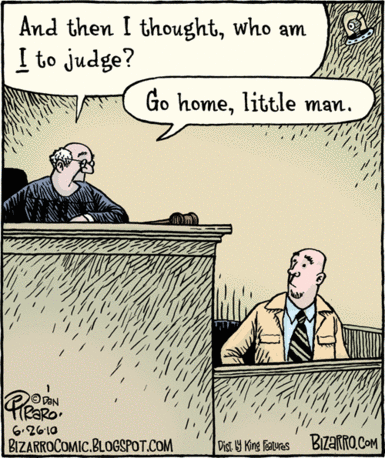"Do not judge according to appearances, but judge with a right judgment" John 7:24
None of us want to be judged. We don’t want people to think that we are bad people, or to assume we have evil motivations. At the same time, we often judge others in the very way we do not want to be judged. We make assumptions of others and think badly of others, sometimes even if we do not have evidence for it. And every time we make a negative assumption about someone, we are placing ourselves over them as judge and jury—and we might even sentence them if we have the chance. Of course, Jesus has much to say about judging, but some of it may be surprising to us.
Jesus says that by whatever standard we judge, we will be judged by God. (Matthew 7:1-2)
We are all being judged by God, but unlike us, God is completely just. To be just to us, God will judge us not only by His standard, but by the standard that we think is right or wrong. If we live against the measure of right and wrong we use on others, then we are hypocrites. This means that whatever principles we use to judge other people, God will make us stand against as well. If we judge other’s because they interrupt or are sarcastic, then we will be judged if we interrupt or are sarcastic.
Jesus says that we should not judge by our own standard, but God’s. (Mark 7:6-8)
To prevent us from being judged unnecessarily, we should not think that another is evil, unless they break God’s standard, not our own, or even our society’s. A person might be rude or difficult to be around, but we cannot determine that they are a “bad person” unless they rebel against God’s standard. (To see what God’s standard is, read the tract, “What are sins against God?”)
Jesus says to be aware of our own misconceptions. (John 5:39; Isa 40?)
We think we know what is true and right all the time. But our minds are weak—sometimes we remember things that didn’t happen and sometimes we forget important things about another person. We don’t often understand why someone did something inconceivable to us, although we are often ready to put a negative spin on it. We need to recognize our weaknesses and double check what we think we know, especially if what a person said or did doesn’t make sense to us.
Jesus says to get our facts straight. (Matthew 18:15-16)
Rather than assume why a person did what they did, we need to talk to them and ask. We cannot assume that a person is a bad person or has done something evil unless we have seen it or heard it from their own lips. If we still have a problem with someone, we should bring someone who is objective before the Lord and ask them for their perspective. But we should never take action based on our own (mis)conceptions or assumptions.
Jesus says to accept people, even if they responded wrongly in the past. (Luke 17:3-4)
If someone says that they repent from their actions, we must accept them. If someone says that we are assuming wrong motivations for their actions, we must accept their statement, unless it is a clear lie. If someone has done us wrong in the past and it seems as if they are doing it again, but we have no clear evidence and they say they are not doing it, we must not assume they are lying. Paul says that to act in love is to “keep no record of wrongs.” We must be a people who accepts openly those who have repented—not those looking for a reason to blame or attack another.
Jesus says to not make assumptions about a person based on their group. (Matthew 8:11-12)
We must not determine what someone is like based on their race, the neighborhood they live in, their family or their social group. Every person is different, and we cannot paint a whole group as evil based on the actions of one or two. Rather, we have to determine who each person is by his or her own actions and words.
Jesus says to let mercy rule over judgement. (Matthew 12:7)
There is a time to determine that someone’s action is evil. But if there is no clear evidence for it, then we are to allow mercy to make a decision. We shouldn’t judge someone based on circumstantial evidence. Nor should we see a contradiction and assume that someone is lying—let us do the work of trying to find out how they are telling the truth. Making negative judgements of others is easy, a cop out. Having mercy on others’ is hard work, but it will help us receive mercy from God.
Jesus says that anyone can change with God’s power. (Luke 15)
Jesus says that we are never to determine who someone will be in eternity. We just don’t know. If Paul, one who hated Jesus and Jesus’ people changed to be one who allowed himself to die for others’, then anyone can change and become a person who lives in God. Instead of thinking evil against those who do evil to us, we should pray for them and ask God to give them grace to repent.
Jesus said all judgment is in God’s hands. (Matthew 12:36)
If someone seems to be doing something wrong, but we can’t prove it, we must recognize that all wrongs will be judged in the final day. We do not need to search and discover every wrong every person does, for it is in God’s hands. (I Timothy 5:24)
Judge not by our own ideas or assumptions,
but on God’s word and the truth.




No comments:
Post a Comment